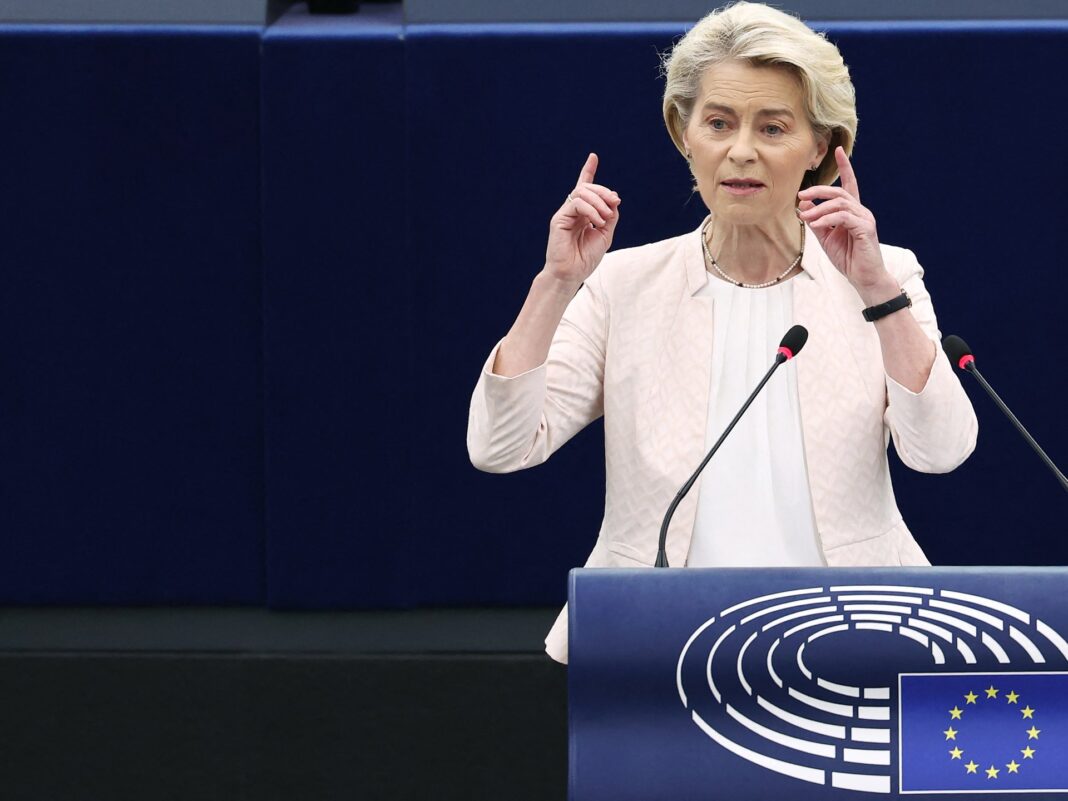After an intense round of negotiations with parliamentary groups across the political spectrum, German conservative politician Ursula von der Leyen secured a second term as president of the European Commission. She won the secret ballot of the newly elected European Parliament with 401 votes in favour, comfortably above the 360 majority required. Other presidents have served two terms before her, but she is the first to be picked twice by the parliament, which, since 2014, elects, and not simply approves, the European Union’s top leader.
The centrist coalition that launched her bid – the centre-right European People’s Party (EPP), the centre-left Socialists & Democrats (S&D), and the centrist liberals of Renew – pulled through with the support of the Greens, who, together with Renew, experienced significant losses in June’s European Parliament elections.
A central issue of debate within the coalition has been whether to isolate or incorporate far-right parties, which have made major gains. Together they have only one less MP than the EPP, currently the biggest group in parliament. The “cordon sanitaire” against the far right has now been restricted to only two of the three far-right groups: Patriots of Europe, where France’s National Rally, Hungary’s Fidesz and Italy’s League with their eurosceptic stances and pro-Vladimir Putin sympathies are likely to give more than a headache to the new commission, and Europe of Sovereign Nations, a collection of ultranationalist parties led by the extremists of Alternative for Germany. Both groups voted against von der Leyen.
Without a clear mandate from S&D, Renew and the Greens but with EPP support, von der Leyen kept an open dialogue with the third far-right grouping in the parliament, the European Conservatives and Reformists (ECR), in an effort to get the votes of Brothers of Italy, the party of Italian Prime Minister Giorgia Meloni and the ECR’s most prominent political formation. In the end, the ECR said members would vote according to their “national interests”. Meloni’s party voted against the German technocrat but got one parliamentary vice president elected alongside another ECR Latvian MEP.
Von der Leyen’s programmatic speech to the parliament on Thursday shows that European technocracy’s turn to the right runs deeper than contingent power dealing.
The re-elected European Commission president has refined an effective rhetorical style that, drawing on right-wing keywords such as “culture” and “values”, elevates Europe into an imaginary object to be treasured and yearned for – what she sums up as “our European way of life”. Europe is “our homeland” with a symbolic role akin to that of the “nation” in far-right discourse.
Von der Leyen’s Europe is facing several threats that need protective and decisive action. The Green Deal – probably her most important bipartisan legacy – is reframed in the language of economic prosperity and competitiveness, echoing the brand of economic nationalism that former President Donald Trump mainstreamed in the United States. The focus is on creating wealth and prosperity for European companies, farmers and workers with no meaningful talk of alliances with other world players – least of all Global South countries, which hold the bulk of the critical raw materials needed for the green transition. Pushed by the EPP, this is a conservative response to the massive wave of green scepticism that hit the ballot box in June – attacking European green policies is the new “culture war” of the far right.
Von der Leyen claimed Europe needs protection from external security threats – not only from war through the legitimate and widely agreed goal of a common European defence system but also from migrants and refugees. Endorsing the European anti-immigration consensus in the streets, she pledged to expand the heavily criticised European border agency, Frontex. This is likely to produce even more death, suffering and human rights violations for those who try to cross borders into Europe while fleeing from wars, natural disasters and poverty.
Echoing Meloni’s Mattei Plan for Africa, von der Leyen cynically announced a new commissioner for the Mediterranean region, whose role will be overseeing strategic partnerships with non-European countries linked to stopping migration flows. The blueprint is the infamous agreement signed with Tunisia last year – marked by two joint visits to Tunis by von der Leyen, Meloni and then-Dutch Prime Minister Mark Rutte and pledging more than 1 billion dollars to help Tunisia out of its unprecedented economic crisis in exchange for preventing departures from Tunisian shores to Europe.
Protecting democracy – another key theme of the German politician’s narrative – has also been narrowly framed under the need to counter hostile outside forces. She proposed a European Democracy Shield to deal with foreign information manipulation and interference. These concerns are real and need to be addressed, but surely there is more to preserving and reinvigorating democracy.
As a consensus leader – a necessity dictated by the structure of the European Union – von der Leyen rightly highlighted the importance of social rights and social dialogue. She put forward a housing plan that speaks to the dire situation of millions of European workers who are struggling to find decent, affordable accommodation, especially in cities. Yet her speech left one feeling that signalling to her progressive allies was a mere footnote to her core vision.
Ultimately, von der Leyen is advocating for an inward-looking Europe that prioritises its own wealth and privilege over global cooperation and social justice while intensifying scare-mongering, hate and violence against migrants and refugees. The results of the June elections suggest that the European Commission president might be interpreting the sentiments of large sections of the European populace. While progressive forces are engaging her on inequality, welfare and the environment, opposition to her anti-immigration policies remains muted. Europeans who believe humanity and solidarity are non-negotiable foundational principles for Europe’s future will have a hard time fighting against the current.
The views expressed in this article are the author’s own and do not necessarily reflect Al Jazeera’s editorial stance.







